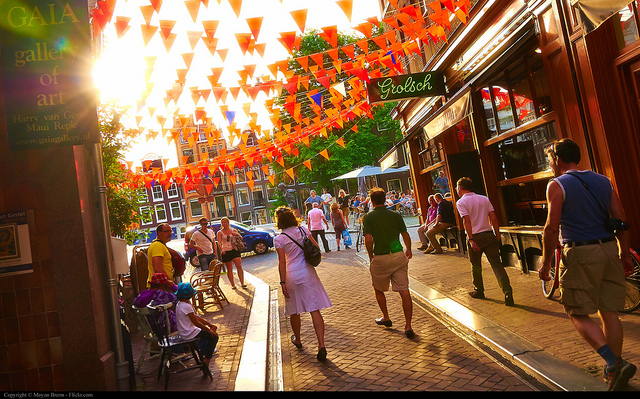IT may not have the global presence of English, the suave appeal of French or the intensity of Spanish, but learning Dutch is definitely worth it if you’re ever thinking of studying in the Netherlands. Having spent a year there myself, I know what it’s like to (attempt to) learn Dutch and I’m going to share some of the methods I used, as well as some difficulties I encountered.

At the beginning of my stay, I was very excited about the prospect of learning a new language. I held the firm belief that, regardless of which method I would choose for my endeavours, I was going to succeed in the end. So, I came prepared with a few phrases in Dutch, certain that I was going to pick up some more soon just by talking to the locals. This immersive method had previously worked for me in learning German (a challenging language in itself), and I was sure that it was going to prove just as productive in Dutch.
However, I had over-estimated the power of immersive learning. I quickly discovered that any time I attempted to try out my basic Dutch (either at the supermarket, ordering in a café or asking for directions in the street), I would immediately be spoken to in English. I was quick to put this reaction down to the fact that the locals had grown so accustomed to the international population of a small university town that they automatically spoke in English to strangers. Or my Dutch was SO bad that any native speaker would just want to put me out of my misery by speaking to me in English.
In fact, over the first couple of months, the only occasion I got to speak any Dutch was when my 80-year-old second floor neighbour complained about the noise. This situation was (from a language-learning point of view) a blessing in disguise, because I managed to replace intense hand gestures with phrases: Het spijt me (I’m sorry); Het geluid is afkomstig van onze buren (The noise is coming from our neighbours) and Het spijt me dat ze je wakker! (I’m sorry that they woke you up!).
All jokes aside, when living in the Netherlands, I’ve come to realise that the Dutch language is a very important element of national culture and heritage, which is why Dutch people are inherently protective of it. I’m not sure if they do it intentionally, or it’s merely a knee-jerk reaction to a breach of their cultural privacy. Any moment they notice that you have even the slightest hint of a foreign accent, they immediately speak in English. I believe that their protective attitude is not meant to put off foreigners from learning their language, but to encourage them to learn the language better. That is why, over the year I was in the Netherlands, I noticed that locals became a lot more receptive when I developed a Dutch accent. If there’s anything I took pride in achieving during my year there, it’s my managing to mingle with the locals.
Of course, it’s important to remember that the Dutch are very kind and open people – underneath that abrupt (somewhat rude at first glance) exterior – ready to welcome anyone into their midst. They don’t share the French stiff-upper-lip attitude to foreigners (when they famously pretend to not understand English) or the German tendency of speaking to foreigners in the most intricate language. The Dutch are very practical and want to avoid wasting anyone’s time – yours or theirs. Their English is nearly flawless, so they are ready to help in any situation. They have the same attitude to fellow Dutch speakers.

My advice is that if you want to learn Dutch properly you’ll be better off taking a course first and when you’ve reached a certain level of proficiency you can practice in real-life situations.
Nevertheless, it’s always a good idea to know where to start, so here are 10 phrases I found particularly useful during my stay and I hope you will too! Veel Succes!